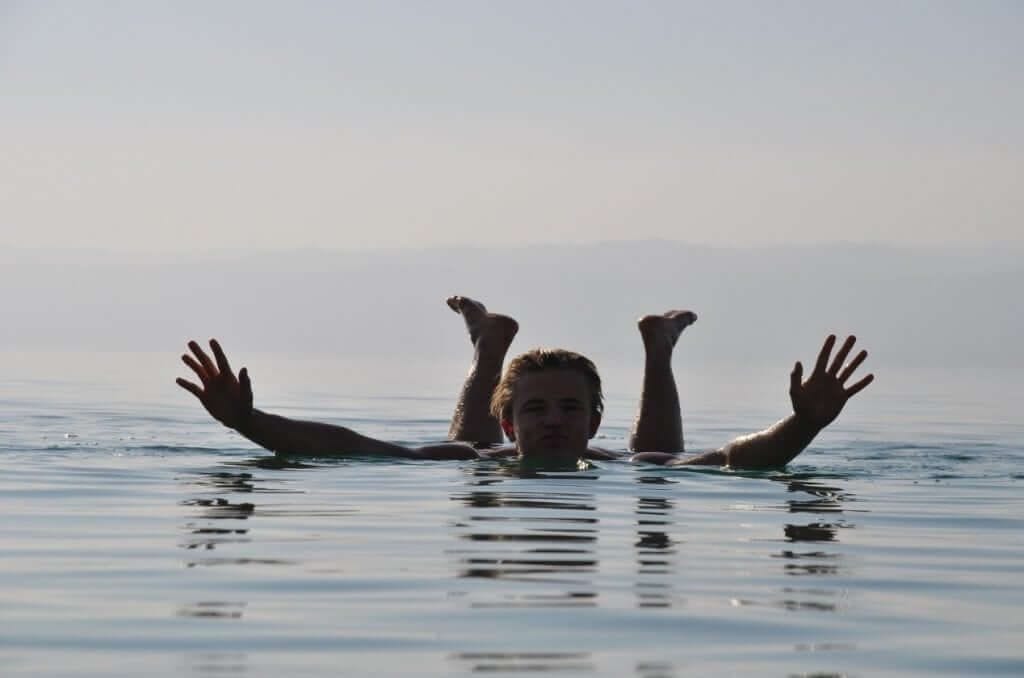Why is the Dead Sea called the Dead Sea?
What is Dead Sea?
The Dead Sea is the lowest point on Earth at 430.5 meters (1412 feet) below sea level. It is a majestic and mysterious looking lake of light turquoise waters with salt crystals jutting out of it, and golden-brown hills surrounding it.
Where is the Dead Sea?
It is located in the Jordan Rift Valley, bordered by Israel to the East and Jordan to the West. Its hyper-salty waters and mineral-rich mud are known for their many health benefits, and many tourists and locals alike visit the hotels and spas on its beaches for mud treatments and salt baths.
Why is the Dead Sea called the Dead Sea? Oh, this is an interesting story. Read on to find out!
Why is the Dead Sea so salty?
The Dead Sea is famously known for being one of the saltiest bodies of water in the world, and certainly the deepest hyper-saline in the world, at a depth of 304 meters (997 feet). And the reason for this high salinity? The Dead Sea is a terminus for the flow of rain and surface water, which means water flows into it but doesn’t flow out: its water has no escape, but is trapped to evaporate. Soaring summer temperatures and year-round hot dry climatic conditions make it a perfect place to spend unforgettable holidays yet lead to significant losses of water to evaporation. The water has been losing its H2O content for 65,000 years, with the minerals becoming more and more concentrated and salt prominent among them.
How did the Dead Sea get its name?
In various languages, the Dead Sea is referred to by different names, all reflective of its characteristics. Let’s take a look at all its different names and understand their origins.
The Salt Sea
The Dead Sea’s earliest known name is recorded in the Hebrew Scriptures, where it is referred to as “the Salt Sea”, from the Book of Genesis through to The Prophets and later writings. This name was given to due to its unique character: its significantly high salt content, which makes it a source for rock and sea salts.
 In the later Roman Era, salt was a highly-valued, strictly controlled commodity, more so than gold or silver. The Roman armies were paid in salt, rather than hard currency, The Latin word for salt – “sal” – forms the basis of the word ‘salary’ from this same meaning. The Romans, beginning with Emperor Trajan, constructed a series of fortresses to dominate every entry and exit ravine for the movement of Dead Sea salt, guaranteeing the payments of tax by the traders. This tax was also paid in salt, rather than coinage.
In the later Roman Era, salt was a highly-valued, strictly controlled commodity, more so than gold or silver. The Roman armies were paid in salt, rather than hard currency, The Latin word for salt – “sal” – forms the basis of the word ‘salary’ from this same meaning. The Romans, beginning with Emperor Trajan, constructed a series of fortresses to dominate every entry and exit ravine for the movement of Dead Sea salt, guaranteeing the payments of tax by the traders. This tax was also paid in salt, rather than coinage.

The Dead Sea
Earliest translations of the name of the Dead Sea into non-indigenous languages often use its original name of “The Salt Sea”, but already by the Roman Era, visitors to Judea had begun to refer to the sea as the “Dead Sea”, as they were mostly struck with how the waters were devoid of all life-forms, whether plants or living creatures.
The Dead Sea origins in the past clarify the matter even better. In the days when the Jordan River flowed south from the Sea of Galilee with full force in the wet season, one could witness reeds and fish swept down with the river flow into the highly saline water of the Dead Sea. As neither fish nor algae can possibly survive in water which is nearly 10 times saltier than most oceans, it was a death-trap for them.
The Dead Sea origins in the past clarify the matter even better. In the days when the Jordan River flowed south from the Sea of Galilee with full force in the wet season, one could witness reeds and fish swept down with the river flow into the highly saline water of the Dead Sea. As neither fish nor algae can possibly survive in water which is nearly 10 times saltier than most oceans, it was a death-trap for them.

